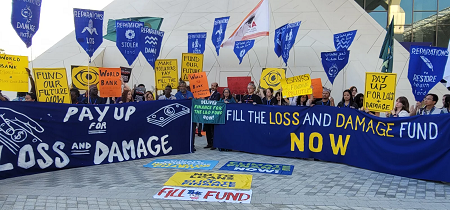Toward Remedy: What’s Happening with the Loss & Damage Fund?

The Executive Board of the Fund for responding to Loss and Damage (FLD) Board held its 4th meeting in Manila, its new secretariat, on 2–5 December 2024. It was its 1st meeting since the selection of the Executive Director (ED), Ibrahima Cheikh Diong, which happened at the 3rd meeting at Baku, in September. This time, the Board was able to refocus on some substantive matters related to the FLD’s operational set-up.
Although the final texts of adopted decision are not available yet, and draft decisions prepared during the session were not shared with observers. However, reports indicate some progress, with some stagnation on issues considered key to civil society and Indigenous Peoples.
The Board adopted the Additional Rules of Procedure of the Board of the FRLD. However, the anticipated policy for including Active Observers has been postponed. Abackground paper (including a draft decision), prepared by the Secretariat and published less than 24 hours before the meeting, calls for further consultations, including with the 9 observer constituencies of the UNFCCC, to present recommendations for consideration at the 6th Board meeting in April 2025.
Meanwhile, the draft decision is problematic because it:
- Proposes an Active Observer seat for the private sector,
- Prescribes how observers should engage within their constituencies, rather than respecting the UN-wide principle of self-organization,
- Puts undue burden on Active Observers such as requiring reports to the Board.
Nonetheless, the draft calls for Active Observer seats for Indigenous Peoples, youth and children, women, and environmental NGOs in line with the Governing Instrument (however, only 1 per group), and for affected communities. It also provides for support to Active Observers traveling from developing countries
Accreditating Observers
The Board took the decision taken to adopt a “blanket approach” to accreditation of observer organizations for an interim period of no more than 3 years, during which the Fund would work on a comprehensive framework for all observer engagement.That means that organizations already accredited to the UNFCCC or any of the operating entities of its Financial Mechanism can easily obtain accreditation.
The Board discussed the FLD’s operational model and plan for early interventions (2025–26) based on proposals made by the ED, and mandated the Secretariat to continue working on these with a view of fully operationalizing the Fund by 2027. See the presentation made by the ED on 4 December with a focus on the early interventions phase here.
The Board’s decision for the start-up phase included operational principles, among them were:
- A first set of interventions “in support of bottom-up, country-led approaches, including technical support and a direct budget support system”;
- Simplified procedures and fast-tracked screening to determine functional equivalency, including for safeguards and standards;
- An initial allocation framework (considering that FLD has only US$730 million so far).
By their request, observers presented the current thinking around community access, its meaning, importance, and how ensure community input, including through case studies. Board members views on the topic were divided, particularly over what that means for the “country-led” (i.e., exclusively government-driven) approach and how to measure success.
Consistent with well-established good practice, the Board held a dialogue with civil society on the second day of the 5th meeting. You can find all civil society and Indigenous Peoples interventions here, and watch the dialogue, including responses by Board members here (from 30:35).
Lien Vandamme (CIEL) contributed reporting from the meeting.
Photo: Demonstration outside the FLD Board meeting. Source: Liane Schalatek,CC-BY-NC-ND 4.
|